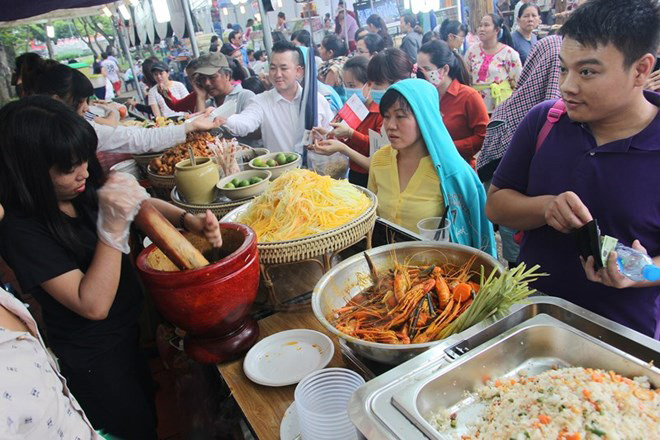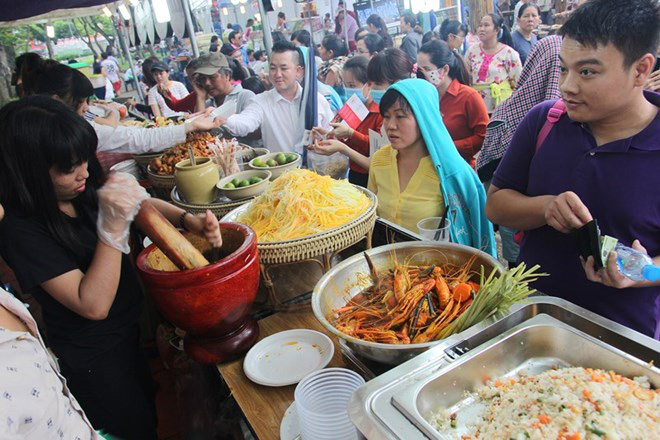
Excellent cuisines of Vietnam and foreign countries will be introduced at 100 booths at the 12th Taste of the World festival scheduled for January 11-14 in Ho Chi Minh City.

Visitor at 11th Taste of the World festival. (Photo: plo.vn)
The event, jointly held by the
municipal Department of Tourism and the Vietnam Tourism Association, draws the
participation of foreign countries like Denmark, Argentina, Italy and Thailand,
the organising board said on January 4.
The booths will be arranged into various zones, including international corner,
Vietnamese corner, street food, special corner and entertainment corner.
Nguyen Thi Anh Hoa, Deputy Director of the municipal Department of Tourism,
said that the event aims to promote Vietnamese specialty and foreign dishes
while creating opportunities to promote regional and international friendship
and cooperation.
Last year, the event attracted 300,000 visitors.
Source: VNA
With an increasingly vibrant and widespread emulation movement aimed at building cultured residential areas and cultured families, Yen Thuy District has been making steady progress toward improving both the material and spiritual well-being of its people, while fostering a civilized, prosperous, beautiful, and progressive community.
Once lacking recreational spaces and community facilities, Residential Group 2 in Quynh Lam Ward (Hoa Binh City) has recently received attention for the construction of a new, spacious, and fully equipped cultural house. The project followed the model of state support combined with public contributions in both labor and funding.
The "All people unite to build cultural life" movement, which has been effectively integrated with Kim Boi district’s socio-economic development goals, is fostering a lively spirit of emulation across local residential areas, hamlets, villages, public agencies, and enterprises. In addition, through the initiative, traditional cultural values are being preserved and promoted, while community solidarity and mutual support in poverty reduction and economic development are being strengthened.
A working delegation of the Hoa Binh provincial People’s Committee led by its Permanent Vice Chairman Nguyen Van Toan on June 11 inspected the progress of a project to build the Mo Muong Cultural Heritage Conservation Space linked to tourism services in Hop Phong commune, Cao Phong district.
Born and growing in the heroic land of Muong Dong, Dinh Thi Kieu Dung, a resident in Bo town of Kim Boi district, in her childhood was nurtured by the sweet lullabies of her grandmother and mother. These melodies deeply imprinted on her soul, becoming an inseparable part of her love for her ethnic group's culture. For over 20 years, this love for her hometown has driven Dung to research, collect, and pass down the cultural values of the Muong people to future generations.
In the final days of May, the Ethnic Art Troupe of Hoa Binh Province organized performances to serve the people in remote, mountainous, and particularly disadvantaged areas within the province. These were not just ordinary artistic shows, but they were the meaningful journeys aimed at spreading cultural values, enhancing the spiritual life of the people and contributing to the preservation of ethnic minority cultural identities.



